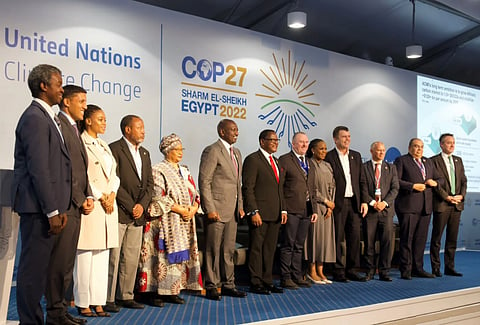

A new initiative putting carbon credits up for sale in African countries was launched during the 27th Conference of Parties (COP27) to the United Nations Framework Convention on Climate Change in Sharm El-Sheikh, Egypt. Carbon markets can unlock billions in climate finance needed to support economies of African countries.
African Carbon Markets Initiative (ACMI) aims to rally the world towards more ambitious climate action, expand the continent’s participation in voluntary carbon markets and create jobs while protecting biodiversity.
A carbon credit is a special permit that gives the user or buyer express rights to emit a given amount of carbon dioxide or other greenhouse gases. Carbon credits trading is one of the many technical interventions used to reduce the amount or concentration of greenhouse gases in the atmosphere.
Several countries like Kenya, Malawi, Gabon, Nigeria and Togo announced their commitment to scaling voluntary carbon markets at COP27.
The initiative can be a game-changer in mitigations against climate change across Africa and has been endorsed by African leaders, policymakers and carbon credit experts, according to a press note.
The leaders announced their ambitions to grow the African voluntary carbon markets at the launch by producing 300 million carbon credits every year by 2030 and 1.5 billion credits annually by 2050. This can unlock $6 billion (Rs 49,041 crore) in income and support over 30 million jobs.
There are concerns and doubts about real frontline victims like ordinary African farmers benefiting from the initiative. However, many leaders, policymakers, experts and activists believe that the launch of carbon markets is timely.
“I take this opportunity to express Kenya’s strong interest in a strong partnership with the initiative, motivated by its desire to unleash the full potential of carbon markets as a means of supporting climate action across Africa,” President William Ruto of Kenya said.
Ruto also cited East Africa’s ongoing worst drought in the last 40 years and warned that prevailing trends in global warming signal that even more difficult times lie ahead.
Several experts believe carbon markets offer an excellent opportunity to unlock billions for Africa’s contentious climate finance needs, the note said.
Major carbon credit buyers and financiers, like Exchange Trading Group and Standard Chartered, have announced ambitious plans to set up an advance market commitment (AMC) for high-integrity African carbon credits, it added.
“ACMI needs political goodwill and the support of technical experts to adopt international best practices from leading European carbon market,” said the United Nations Climate Change High-Level Champion for Egypt Mahmoud Mohieldin.
The ACMI is a significant boost in the diversification of the continent’s climate financing, said Damilola Ogunbiyi, the chief executive officer for the UN Economic Commission for Africa and Sustainable Energy for All.
US-AID Chief Climate Officer, Gillian Caldwell, emphasised the need for high-integrity credits, with transparent and equitable distribution of revenues directly channelled to frontline communities.
“The African voluntary carbon market will only succeed if people trust that African credits are driving real climate action and having a positive human impact,” he said.
ACMI needs to collaborate with other regional carbon market platforms and global integrity initiatives like the Voluntary Carbon Markets Integrity Initiative, Caldwell added.
Nigeria is committed to carbon credits because the sector will soon become a major industry and benefit citizens, said the country’s Vice-President Yemi Osinbajo. “Nigeria is putting the groundwork in place now for future benefits,” he said.
Several other experts, including Africa Director for the UN Climate Change High-Level Champions, Bogolo Kenewendo, said the ACMI will go a long way in unlocking billions for climate finance and economic development, especially if there is a fair price for carbon credits.
The overall caution from experts and critics included calls for regulation of voluntary markets, which are often unchecked. Stringent policies are needed to check on social safeguards to avoid human rights abuses and ‘greenwashing’ loopholes that some corporations exploit to masquerade as eco-friendly without reducing requisite emissions.